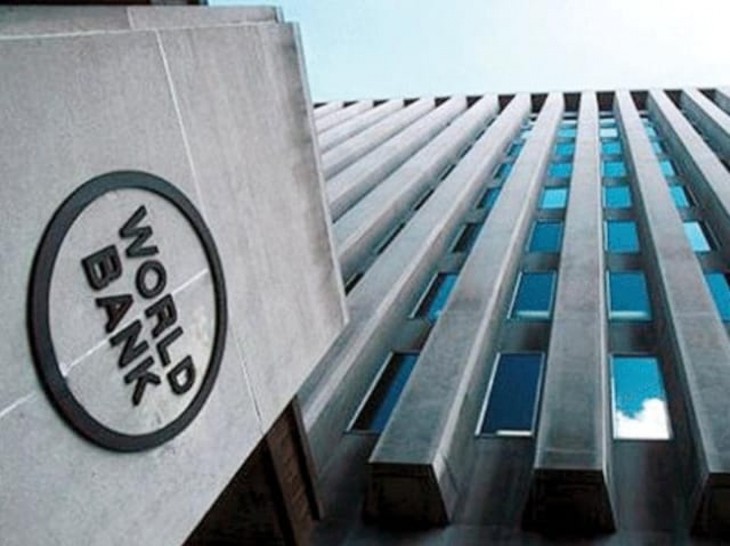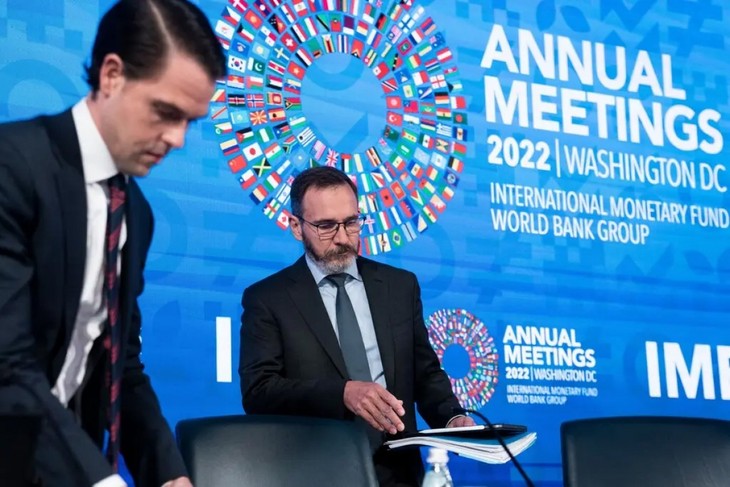(VOVWORLD) -Due to geopolitical complications, the global economic recovery and growth are facing various risks and challenges. Major economies and global economic-financial institutions, led by the World Bank (WB) and the International Monetary Fund (IMF), are seeking solutions.
 (Photo: Business Standard) (Photo: Business Standard) |
Latest assessments by global financial institutions show that the global economy continues to be adversely affected by many factors, including the Russia-Ukraine conflict, rising tensions on the Korean peninsula, instability in the Middle East, US-China relations, OPEC+'s decision to cut crude oil production, and the risk of COVID-19 resurgence.
Worrying signs
At the Spring Conference of the World Bank and the IMF in Washington, D.C., the IMF released the World Economic Outlook Update, forecasting global real GDP growth at 2.8% for 2023 and 3% for 2024, marking a 0.1 percentage point lower than its forecast in January. The decline in world economic growth forecast reflects the weakness of some big economies and the possibility of central banks to continue tightening monetary policy to curb rising inflation.
The IMF also said that global public debt is higher and growing faster than forecast compared to the pre-COVID period, mainly due to increasing public debts in the US and China, the world’s two largest economies. Global public debt increased nearly 100% of GDP in 2020, before falling sharply last year but still higher than before the pandemic. The IMF on Wednesday forecast the world's ratio of debt to gross domestic product will climb to 99.6% by 2028, almost matching the level seen in 2020.
The latest report of Fitch Ratings shows that the default rating of countries has increased significantly in recent years. There have been 14 separate default events since 2020, across nine different sovereigns, Belarus, Lebanon, Ghana, Sri Lanka, Zambia, Argentina, Ecuador, Suriname, and Ukraine, compared with 19 defaults across 13 countries between 2000 and 2019.
The Fitch Ratings report underlined that the global macroeconomic and financial environment remain challenging, especially for countries with low credit ratings. Many sovereign countries have credit ratings of CCC+, which means a high risk of default.
Data released by the US Treasury Department on Wednesday showed that the federal budget deficit hit up to 1.1 trillion USD in the first quarter of fiscal year 2023, an increase of 63%, driven by higher outlays for education, health care benefits, and debt interest payments.
Although inflation tends to ease, it remains high compared to the FED’s target, which increases the possibility that the FED will continue to raise interest rates in the next meeting. Small Business Optimism Index slightly declined from 90.9 in February to 90.1 in March with concerns over record high inflation and interest rates. It’s the 15th consecutive month below the 49-year average of 98.
 IMF Chief Economist Pierre-Olivier Gourinchas (R) (Photo: EPA) IMF Chief Economist Pierre-Olivier Gourinchas (R) (Photo: EPA) |
Enhancing effort
Global economic-financial experts share the view that challenges and risks to the global economy are serious. Without appropriate solutions, the fragile recovery momentum that has just formed may disappear and many economies are at risk of recession. Inflation control should be a priority.
IMF Chief Economist Pierre-Olivier Gourinchas told the Spring Conference that inflation remains the most concerned issue, so monetary policy needs to stay focused on price stability. He called on central banks to continue tightening monetary policy to bring inflation back towards its targets.
Experts recommend economies developing additional risk response plans for the scenario of widespread and prolonged geopolitical instability, followed by food and energy price hike. But in the long run, governments need to consistently pursue the goals of sustainable growth to minimize and move towards "immunity" to external influences.
Many experts urge big countries and multilateral institutions, led by the United Nations and its Security Council, to intensify efforts to cool down a series of hot spots worldwide, such as the Ukraine conflict, tension on the Korean peninsula, and insecurity in the Middle East in order to create favorable conditions for economic development and inclusive prosperity globally.